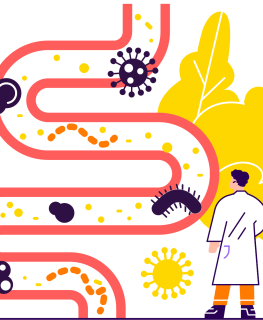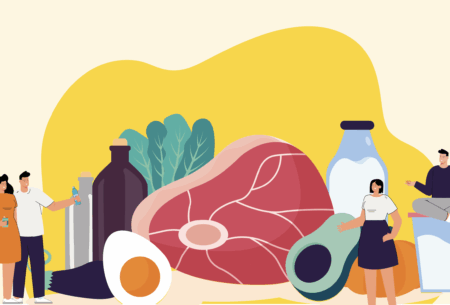As the nights start drawing in, we at the Gut Health Clinic start thinking about vitamin D and making sure we are getting enough of it.
The importance of including Vitamin D in your diet

So what is vitamin D?
This is an essential nutrient used for building and maintaining healthy bones and muscles and preventing conditions such as rickets and osteoporosis. It is also thought to play an important role in our immune health by making changes to our gut microbiome.
Where to get vitamin D?
Most of our vitamin D comes from exposure to sunlight in the summer months, with cells under our skin converting it into an active form (the form of that can be used by the body). Exposing your face, forearms and chest in midday sun for around 15 minutes per day during the summer months (April – September) is enough to get adequate dose.
During the winter, we can not get enough in this way, and so our bodies rely on dietary sources, stores and supplementation to keep us topped up.
Dietary Sources
Foods rich in Vitamin D include:
- Egg yolk
- Milk and milk products
- Fortified breakfast cereals
- Fortified spreads
- Fish such as salmon, sardines, pilchards, and kippers
- Mushrooms
- Plant-based alternative milks/ and milk products which are fortified with the vitamin.
Taking a supplement
It is difficult to get enough vitamin D through diet alone and vitamin D deficiency is one of the most common nutrient deficiencies in the world. This is why, if you are living in the UK, it is recommended that you take a daily vitamin D supplement, in addition to adding some sources of the vitamin to your diet, during the winter months (Oct – Mar).
Picking a supplement
- You should take around 10 micrograms of vitamin D3 per day.
- Both tablet and spray forms are fine to take. Clinic tip: a lot of people find the sprays are super convenient but often they contain sweeteners, if you are trying to keep these to a minimum be sure to double check the ingredients.
Some people are at higher risk of deficiency such as:
- Those who are pregnant or breastfeeding.
- People over the age of 65.
- People with darker skin tones (Middle Eastern, Asian, African and Afro-Caribbean descent).
- If you spend little time outdoors/ in the sunshine or cover up most of your skin when you are outside.
- If you live further North, the sun might not be strong enough for you to make adequate amounts.
Takeaway
Vitamin D is essential for maintaining bone, skin and muscle health. There are plenty of foods rich in Vitamin D, however our diets are not always enough. Taking a supplement during the Winter months, or if you are at risk of developing a deficiency is recommended.
This article was authored by Tanzil Miah, a gut, IBD and surgery conditions specialist dietitian. Do you need support with a symptom, condition or goal? You can book an appointment with Tanzil Miah or any member of our specialist team here.












